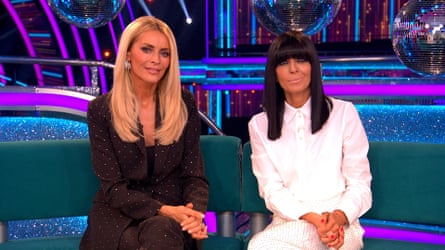When long-serving presenters leave a seemingly timeless franchise, two questions immediately arise. Why are they going? And who will replace them?
On the first point, the BBC will hope that the joint departure of Claudia Winkleman and Tess Daly from Strictly Come Dancing will be attributed to longevity – Daly has served a 21-year term, Winkleman 11 as a main co-host – and the impact on family life of a weekend gig.
Yet if diaries and tiredness were the primary reason for the hosts going, it would have been more likely to be announced much closer to the December end of season 23. This weekend’s shows are only the fifth week of 13.
And it cannot be denied – though the BBC would wish it could – that the appeal of spending 13 Saturday late nights with would-be hoofers in Elstree may have been reduced by almost two years of scandals or allegations about the alleged behaviour, language or favoured stimulants of some participants in the show. These headlines have not affected the presenters, but if you dance with a skunk, it will affect your own scent. At a certain point, agents would worry about contamination by association.
The question also arises in any host-show relationship about the balance of dependency and, for Winkleman in particular, there can be no doubt that the show now needs her more than she needs it. She also fronts The Traitors, the BBC’s biggest entertainment hit since Strictly, and with that series likely to expand in its stranger and star versions, she has even more pressure on her calendar.

On the second question, however, of who Daly and Winkleman’s successors might be, I would not recommend punting your life’s savings on anyone in particular.
Without any insider knowledge on this point, it intrigues me that the BBC’s statement that “plans for the next series will be announced in due course” can be seen as leaving open the possibility that there won’t be a 24th series of Strictly Come Dancing, or at least not next year.
There is a parallel here with another BBC One juggernaut. Strictly Come Dancing and Doctor Who have always made interesting schedule fellows because each is a superior reboot of a 20th century show – Come Dancing (1950-98) and the original Doctor Who (1963-89) – and in their second incarnations they are less than a year apart in age: Strictly launched on 15 May 2004, and the new Who on 26 March 2005. Two decades later, both find themselves in limbo having lost their main performers and with no details of the next run confirmed after BBC statements that leave existential questions open.
The argument that the BBC could not end such recognisable shows assumes that TV hits run forever. They don’t.
Some, like fish or other perishable foodstuffs, suddenly go off. In the late 1990s, Noel’s House Party, which had made Noel Edmonds a BBC One Saturday night ratings topper, suddenly lost half its audience and all of its media interest. In other cases, presenters and network lose their creative energy. Ant & Dec’s Saturday Night Takeaway, ITV’s main weekend entertainment rival to Strictly Come Dancing, was suspended for the foreseeable future earlier this year.
If there exists any possibility that Strictly Come Dancing might join Ant & Dec and The Doctor on such hiatus, then Claudia and Tess would be sensible to separate their own departure and tributes to them from any subsequent coverage of the whole show.
With ratings above 6 million – lower than before but higher than most other terrestrial programmes in an era defined by streamers – stopping the dancing would be a bold call, but with a sense that some hostile media outlets may be targeting the show week after week for bad news, the BBC may decide that it and the production team need a break.
As any 2026 schedule with a Strictly gap or restructuring would surely foreground The Traitors even more, Winkleman is in a winning position. The world of comedy suggests that the breakup of a double-act can disadvantage one former partner more than the other, so transition is important for Daly. It would be a surprise, even professional negligence, if no Winkle-Tess podcast emerges.

.png) 5 hours ago
4
5 hours ago
4

















































